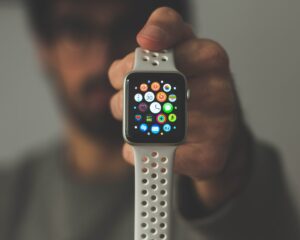Imagine if the pedometer on your wrist did more than just count steps. Imagine it measured blood sugar, detected heart rate irregularities and logged that data in a digital health record.
For decades, health-care data like this was only recorded at the doctor’s office or in a controlled study. Wearable technology has changed that. Armed with a wealth of newly accessible data, patients can now, in many cases, manage chronic health conditions independently. Their doctors, meanwhile, can monitor them from miles away.
That’s a big deal, given that half of adults have at least one chronic disease.
Giving patients the data they nee d to manage these conditions on their own, outside costly clinical settings, could save the U.S. health-care system billions of dollars. And granting researchers access to that real-world data could allow for an entirely new – and much more efficient – way of measuring the effectiveness of treatments.
d to manage these conditions on their own, outside costly clinical settings, could save the U.S. health-care system billions of dollars. And granting researchers access to that real-world data could allow for an entirely new – and much more efficient – way of measuring the effectiveness of treatments.
Consider diabetes, which afflicts almost 10 percent of the population. America spends more on the condition than any other disease – in excess of $100 billion annually.
The standard course of treatment requires patients to monitor their glucose levels and use a combination of diet, medication and insulin therapy to keep those levels in check.
But most patients don’t check their glucose effectively. It’s a pain. They may have to prick their fingers, collect some droplets of blood on a test strip, and then stick that strip in a meter for a reading.
It’s no wonder that most people with diabetes check their glucose levels once or twice a day — even though most clinicians recommend testing two to four times as often.
Fortunately, new wearables are making it easier for people to manage their glucose levels.
Patients in Europe, for instance, have been able to measure their glucose with a device developed by my company, Abbott, called the FreeStyle Libre system. Users can wirelessly scan a small, round sensor on the back of their upper arm to check their glucose, eliminating the need for routine finger sticks. A version of the system was recently approved by the U.S. Food and Drug Administration.
Read More at the Source: Incredible new wearable medical devices can help millions of people and advance medical research
By Jared Watkin | Fox News
Photo by Daniel Cañibano on Unsplash